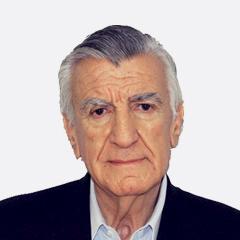
Felipe Solá is an Argentine agricultural engineer and politician. He previously served as Governor of Buenos Aires Province, from 2002 to 2007, and as Minister of Foreign Affairs and Worship under President Alberto Fernández, from 2019 to 2021.

José Manuel de la Sota was an Argentine politician who was a member of Justicialist Party. He was the governor of Córdoba Province from 1999 until 2007, and was reelected to the post for the 2011–15 term.

José Luis Gioja is an Argentine Justicialist Party (PJ) politician, former governor of San Juan Province and former President of the Argentine Senate.

Roberto Gustavo Basualdo is an Argentine politician, formerly of the Justicialist Party (PJ), now in Cambiemos. He sat in the Argentine Senate representing San Juan Province (Argentina) for the Production and Labour party from 2005 to 2023.

Sergio Tomás Massa is an Argentine politician who served as Minister of Economy from 2022 to 2023. From 2019 to 2022, he was the National Deputy for the centre-left coalition Frente de Todos, elected in Buenos Aires Province, and the President of the Chamber of Deputies.
Events from the year 2011 in Argentina.

General elections were held in Argentina on 25 October 2015 to elect the President and National Congress, and followed primary elections which were held on 9 August 2015. A second round of voting between the two leading candidates took place on 22 November, after surprisingly close results forced a runoff. On the first runoff voting ever held for an Argentine Presidential Election, Buenos Aires Mayor Mauricio Macri narrowly defeated Front for Victory candidate and Buenos Aires Province Governor Daniel Scioli with 51.34% of votes. Macri's vote count of nearly 13 million votes made it the highest number of votes any candidate has ever received in Argentinian history, until Javier Milei obtained over 14 million votes in the second round of the 2023 presidential election. He took office on 10 December, making him the first freely elected president in almost a century who was not either a Radical or a Peronist.
Events from the year 2013 in Argentina
The following lists events that happened during 2015 in Argentina.

On the 25 October elections numerous provinces also elected governors, with the new ones beginning their terms on 10 December 2015. These provinces were Buenos Aires province, Catamarca, Chubut, Entre Ríos, Formosa, Jujuy, La Pampa, Misiones, San Juan, San Luis and Santa Cruz, encompassing 11 of the country's 23 provinces. The other provinces elected governors in different days of 2015; the only exceptions were Corrientes and Santiago del Estero whose governors' terms were not due to finish in 2015.

Sergio Casas is an Argentine politician who was Governor of La Rioja Province from 2015 to 2019. He previously served as Vice Governor and as a member of the La Rioja provincial legislature. Since 2019, he has been a National Deputy.

Hugo Passalacqua is an Argentine politician. He served as vice governor of Misiones Province from 2011 to 2015, under Governor Maurice Closs, and served as Governor of Misiones Province from 10 December 2015 to 10 December 2019.

The governor of Salta is a citizen of the Salta Province, in Argentina, holding the office of governor for the corresponding period. The governor is elected alongside a vice-governor. Currently the governor of Salta is Gustavo Sáenz.
The following lists events that happened or will happen in Argentina in 2019.

Gustavo Adolfo Ruberto Sáenz Stiro is an Argentine politician who is currently governor of Salta Province, since 10 December 2019. Previously, from 2015 to 2019, he was intendente (mayor) of the City of Salta, and served from 2009 to 2013 as a member of the Provincial Senate representing the Capital Department.

Humberto Marcelo Orrego is an Argentine lawyer and politician, currently serving as Governor of San Juan since 2023. He previously served as National Deputy from 2019 to 2023, and as intendente (mayor) of his hometown, Santa Lucía, from 2011 to 2019. He is a member of the minor local Production and Labour party.

Sergio Napoleón "Oso" Leavy is an Argentine businessman and politician, currently serving as a National Senator for Salta Province since 2019. A member of the Victory Party and president of the party's Salta chapter, Leavy previously served as a National Deputy from 2017 to 2019, as intendente (mayor) of Tartagal, Salta from 2007 to 2017, and as a member of the provincial Chamber of Deputies from 2003 to 2007.

Walberto Enrique Allende is an Argentine politician, currently serving as a National Deputy elected in San Juan Province since 2017. He belongs to the Justicialist Party. Allende was first elected in 2017 and re-elected in 2021. He previously served as Minister of Human Development of San Juan in the administration of Governor Sergio Uñac from 2015 to 2017, and as intendente (mayor) of Nueve de Julio from 2011 to 2015.

The Chamber of Deputies of San Juan Province is the unicameral legislative body of San Juan Province, in Argentina. It comprises 36 legislators, 19 of whom are directly elected in single-member districts corresponding to the 19 departments of San Juan, and 17 of whom are elected in a single province-wide multi-member district through proportional representation.














